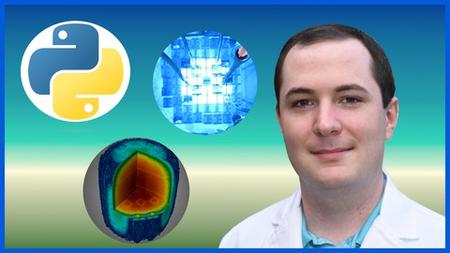
English | MP4 | AVC 1280×720 | AAC 44KHz 2ch | 31 lectures (5h 35m) | 2.22 GB
Ace your homework assignments and get your free time back by learning how Nuclear Scientists and Engineers use Python
Welcome to the best class you will ever take in your science and engineering career!
Let me ask you this – How much would you pay for…
- …actually enjoying your Spring Break without worry because you got your homework done and submitted before the break starts?
- …going to bed earlier because your bug was an engineering units error that was super easy to find and fix in Python?
- …having your professor cite your homework as the solution because its both correct and well presented?
- …actually knowing what is going on in class because you know how to let software handle the heavy math so you can interpret the physical results?
I was a teaching assistant for 3rd year Nuclear Engineering students at North Carolina State University, and I helped my students transition from writing on engineering paper with hand calculators to using software for their homework assignments. Common errors – unit conversions, simple algebra mistakes, labeling your final answer for your grader – dropped significantly after they became proficient in using their chosen software tool. With better homework grades they felt they understood the concepts more, relieving them of stress, and making them feel better prepared for their paper exams. An unfortunate reality is that as you advance in your engineering coursework, you will absolutely need some type of software tool.
Whether you are studying Nuclear Engineering specifically, or are a science student choosing among many different Python courses, I want to help you overcome that sense of imposter syndrome and give you confidence in your work. My hope is that this course will make it easier for you to solve challenging homework problems in your engineering coursework, and give you the confidence to solve real-world problems that pop up in your engineering career.
How can learning Python make my life as a college student easier?
You have enough theory in your science and engineering courses. I’m here to teach you how to use Python how to solve problems in a straight-and-to-the-point practical sense.
Here is what I will teach you in this course that will make your student life immensely easier:
- Make the best-looking homework submissions your graders will ever see with Jupyter Notebooks
- Learn how to type fancy mathematical equations just like your professors using LaTeX
- Never be afraid of Linear Algebra again by letting Python’s numpy package handle matrix operations
- Use Python’s SymPy package to solve Calculus and Differential Equations problems for you
- Breeze through analyzing laboratory data using Python’s Pandas and Matplotlib packages to do statistical analyses and plotting of data from your lab classes – you will (almost) never need to touch Microsoft Excel again!
- Say goodbye to unit conversion errors with Python’s Pint package that automatically handles units and conversions for you
- Develop confidence for your future by learning your rights as a worker, how much you can expect to make in your career, and exploring if remote work is right for you (or if you’d rather play with expensive science toys at a national laboratory)
My name is William Roysdon Murray – I’ve spent too many sleepless nights figuring out how to get my work done as a Nuclear Engineering student. I want to spare you the hassles I went through and return your nights back to you. It will be my pleasure to have you in my course!
What you’ll learn
- Install Python and Jupyter Notebooks on their local machine
- Develop professional looking reports for homework submissions in Jupyter Notebook with LaTeX
- Learn Python syntax to perform basic math operations
- Solve problems in Calculus, Differential Equations, Linear Algebra, and Statistics with Python
- Automate handling Science and Engineering Units with Python’s Pint package
- Tackle problems commonly found in Nuclear Science and Engineering using various Python packages
- Where your skills are needed at US National Labs, US Government Agencies, and Private Companies
- How much money you can expect to make working in Nuclear Science and Engineering – with data to back it up!
- Network with other professionals in Nuclear Science and Engineering to grow your career and share your expertise with peers
Table of Contents
Course Welcome and How to Install Python and Jupyter Notebooks
1 Welcome and Course Overview
2 How to Learn in this Course
3 Industry Examples – Computational Science in Nuclear Engineering
4 Python Installation and Jupyter Notebooks
Jupyter Notebooks
5 Overview – Jupyter Notebooks
6 Cell Types – Code, Markdown, and Raw
7 LaTeX Introduction – Properly Typing Equations
8 Exporting Notebooks for Submission
Basic Mathematics and Python Programming
9 Overview – Basic Mathematics and Python Programming
10 PEMDAS and Trigonometric Operations
11 Variable Types
12 Loops and Flow Control
13 Plotting Results w Matplotlib and numpy
14 Additional Resources for Python Documentation
University Mathematics
15 Overview – University Mathematics
16 Linear Algebra and Matrix Operations with numpy
17 Calculus – Derivatives and Integrals with SymPy
18 Differential Equations with SymPy
19 Basic Statistics with Pandas
Solving Homework Problems in Nuclear Science and Engineering
20 Overview – Solving Homework Problems
21 Engineering Units with Pint
22 Random Number Generation and Monte Carlo
23 Iterative Solutions and Convergence
24 Steam Tables and Equations of State w Python Functions
Don’t skip this section! – Career Guidance and Advice
25 Overview – Career Guidance and Advice
26 Who’s Hiring – National Labs, Utilities, and Everyone Else
27 Know Your Worth – US Bureau of Labor Statistics
28 You Have Rights – OSHA, US NRC, and the National Labor Standards Act
29 Remote, Hybrid, Office, or Hands-On Work – Which is for me
30 Networking and Professional Societies
31 Course Closure and Final Request
Resolve the captcha to access the links!